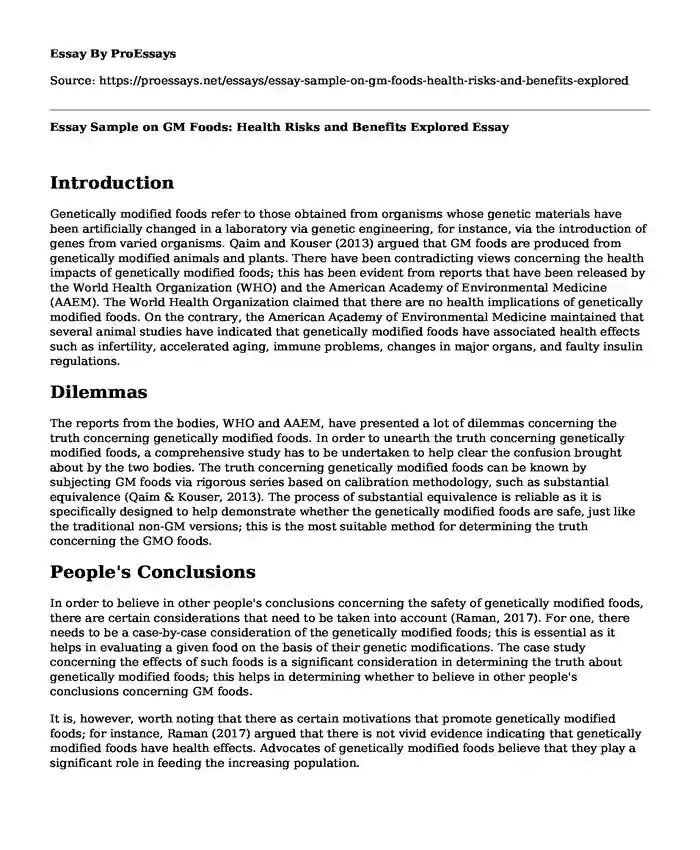Introduction
Genetically modified foods refer to those obtained from organisms whose genetic materials have been artificially changed in a laboratory via genetic engineering, for instance, via the introduction of genes from varied organisms. Qaim and Kouser (2013) argued that GM foods are produced from genetically modified animals and plants. There have been contradicting views concerning the health impacts of genetically modified foods; this has been evident from reports that have been released by the World Health Organization (WHO) and the American Academy of Environmental Medicine (AAEM). The World Health Organization claimed that there are no health implications of genetically modified foods. On the contrary, the American Academy of Environmental Medicine maintained that several animal studies have indicated that genetically modified foods have associated health effects such as infertility, accelerated aging, immune problems, changes in major organs, and faulty insulin regulations.
Dilemmas
The reports from the bodies, WHO and AAEM, have presented a lot of dilemmas concerning the truth concerning genetically modified foods. In order to unearth the truth concerning genetically modified foods, a comprehensive study has to be undertaken to help clear the confusion brought about by the two bodies. The truth concerning genetically modified foods can be known by subjecting GM foods via rigorous series based on calibration methodology, such as substantial equivalence (Qaim & Kouser, 2013). The process of substantial equivalence is reliable as it is specifically designed to help demonstrate whether the genetically modified foods are safe, just like the traditional non-GM versions; this is the most suitable method for determining the truth concerning the GMO foods.
People's Conclusions
In order to believe in other people's conclusions concerning the safety of genetically modified foods, there are certain considerations that need to be taken into account (Raman, 2017). For one, there needs to be a case-by-case consideration of the genetically modified foods; this is essential as it helps in evaluating a given food on the basis of their genetic modifications. The case study concerning the effects of such foods is a significant consideration in determining the truth about genetically modified foods; this helps in determining whether to believe in other people's conclusions concerning GM foods.
It is, however, worth noting that there as certain motivations that promote genetically modified foods; for instance, Raman (2017) argued that there is not vivid evidence indicating that genetically modified foods have health effects. Advocates of genetically modified foods believe that they play a significant role in feeding the increasing population.
Conclusion
Conclusively, there is a dilemma concerning the health safety of genetically modified foods; this is due to contradicting reports from the WHO and AAEM. A calibration methodology such as substantial equivalence, therefore, needs to be undertaken to determine the truth concerning GM foods.
References
Qaim, M., & Kouser, S. (2013). Genetically Modified Crops and Food Security. Plos ONE, 8(6), e64879. https://doi.org/10.1371/journal.pone.0064879
Raman, R. (2017). The impact of Genetically Modified (GM) crops in modern agriculture: A review. GM Crops & Food, 8(4), 195-208.
https://doi.org/10.1080/21645698.2017.1413522
Cite this page
Essay Sample on GM Foods: Health Risks and Benefits Explored. (2023, Oct 13). Retrieved from https://proessays.net/essays/essay-sample-on-gm-foods-health-risks-and-benefits-explored
If you are the original author of this essay and no longer wish to have it published on the ProEssays website, please click below to request its removal:
- Children with Disabilities in Foster Care Systems - Research Paper Examlple
- Medicine Literature Review: History and Background of Salmonella
- Essay Sample on The Evolution of Environmental Thinking in Nursing
- Essay Sample on Future Development of Nursing
- Paper Example on GERD: Symptoms, Causes, and Treatment
- Essay Sample on Deafness: Communication and Lifestyle in the Modern World
- Cancer: Over 100 Types, Unregulated Cell Division, Global Threat - Research Proposal







